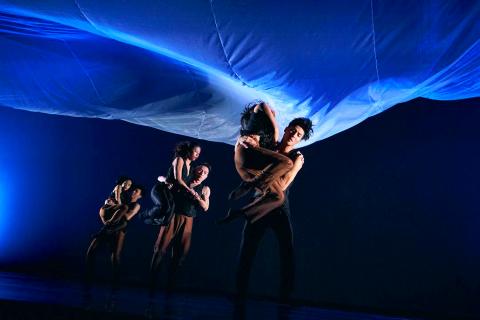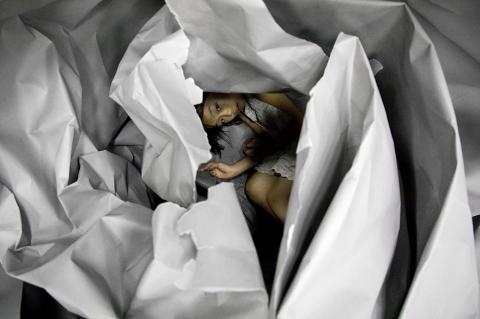Artistic endeavors are often described as flights of fancy. Two works that will be performed in Taipei this weekend definitely fit that description: Taipei-based WCdance’s (林文中舞團) The Wind Rises (風起) and After Game (遊戲之後) by Feng Dance Theater (風乎舞雩), a small company whose name comes from a passage about breezes in The Analects of Confucius.
Choreographer Lin Wen-chung (林文中) has long been inspired by flight. He drew on his teenage love of model airplanes for his 2015 work, Aerodynamics (空氣動力學), while his latest creation, The Wind Rises, was inspired by Japanese artist and director Hayao Miyazaki’s 2014 anime film of the same name.
The film was a semi-fictional biography of aeronautical engineer Jiro Horikoshi, who designed the Zero fighter and other military aircraft. For the title, Miyazaki drew on a line from Paul Valery’s poem Le Cimetiere Marin (The graveyard by the sea): “The wind is rising! We must try to live.”

Photo courtesy of Lin Ting Tai
“The director [Miyazaki] combined two stories, one about the designer of the planes used in kamikaze attacks and how he fell in love with a girl who was ill and passed away. It is about how people pursue their dreams and costs,” Lin said in a telephone interview on Monday.
“It’s very different from my previous works … friends say it is more emotional. My pieces are usually more cool,” Lin said.
“I don’t what made this change, time or maybe my age,” he joked.

Photo Courtesy of Feng Dance Theater
He recruited some of the same team that worked on Aerodynamics, including composer Lin Fang-yi (林芳宜) and multi-media artist Ethan Wang (王奕盛).
However, this time around Wang did not create projections, but designed the set.
“This time he is behind the scenes. He told me to save money, keep it simple, since the projectors needed for his usual projections are very expensive,” Lin said. “The stage is beautiful.”
In an usual move for his company, Lin premiered The Wind Rises on Saturday last week in Hsinchu. However, it was another pragmatic decision, like simplifying the stage: the Hsinchu Performing Arts Center let him use the theater for two weeks of rehearsal, an amount of time that is rare in Taiwan’s performing world.
Costs are a concern because Lin has basically outgrown the Experimental Theater at the National Theater, where his company performed for its first few years. The black-box space has seating for just about 240 people.
This time around the two shows in Taipei will be at the Metropolitan Hall, a mid-sized stage, but with seating for about 1,000, which means Lin has a lot of tickets to sell. The company is doing fairly well on that front; there are just about 300 seats left for each of the two shows.
One company that has not yet outgrown the Experimental Theater is Feng Dance.
The 12-year-old Tainan-based company premiered its newest production, After Game, at the Tainan Municipal Cultural Center on Nov. 25.
It will be at the Experimental Theater for three shows, starting on Saturday afternoon.
Choreographed by the troupe’s artistic director, Dominique Yen (顏鳳曦), After Game is an exploration of life and death as seen through the eyes of children and parents.
Children often ask questions that adults find difficult to answer, such as “Where do we come from?” and “What happens after you die?” They often use games or play to resolve the challenges they encounter.
Yen was interested in exploring how to answer such questions, both as an artist and as a mother; how to think about the meaning of life in a creative way and how to teach children about cherishing life’s little moments.
In addition to creating works for her company and other troupes, Yen, who is an assistant professor of dance at the Tainan University of Technology, has been a frequent contributor to Kaohsiung City Ballet’s (高雄城市芭蕾舞團) annual Dance Shoe (點子鞋) production, with pieces that reflect the best of ballet and modern dance traditions.
In other dance-related news, congratulations are in order for Century Contemporary Dance Company (世紀當代舞團) founder Yao Shu-fen (姚淑芬). She was named on Tuesday one of the seven winners of this year’s National Award for Arts by the National Culture and Arts Foundation.

March 2 to March 8 Gunfire rang out along the shore of the frontline island of Lieyu (烈嶼) on a foggy afternoon on March 7, 1987. By the time it was over, about 20 unarmed Vietnamese refugees — men, women, elderly and children — were dead. They were hastily buried, followed by decades of silence. Months later, opposition politicians and journalists tried to uncover what had happened, but conflicting accounts only deepened the confusion. One version suggested that government troops had mistakenly killed their own operatives attempting to return home from Vietnam. The military maintained that the

Taiwan has next to no political engagement in Myanmar, either with the ruling military junta nor the dozens of armed groups who’ve in the last five years taken over around two-thirds of the nation’s territory in a sprawling, patchwork civil war. But early last month, the leader of one relatively minor Burmese revolutionary faction, General Nerdah Bomya, who is also an alleged war criminal, made a low key visit to Taipei, where he met with a member of President William Lai’s (賴清德) staff, a retired Taiwanese military official and several academics. “I feel like Taiwan is a good example of

Jacques Poissant’s suffering stopped the day he asked his daughter if it would be “cowardly to ask to be helped to die.” The retired Canadian insurance adviser was 93, and “was wasting away” after a long battle with prostate cancer. “He no longer had any zest for life,” Josee Poissant said. Last year her mother made the same choice at 96 when she realized she would not be getting out of hospital. She died surrounded by her children and their partners listening to the music she loved. “She was at peace. She sang until she went to sleep.” Josee Poissant remembers it as a beautiful

Before the last section of the round-the-island railway was electrified, one old blue train still chugged back and forth between Pingtung County’s Fangliao (枋寮) and Taitung (台東) stations once a day. It was so slow, was so hot (it had no air conditioning) and covered such a short distance, that the low fare still failed to attract many riders. This relic of the past was finally retired when the South Link Line was fully electrified on Dec. 23, 2020. A wave of nostalgia surrounded the termination of the Ordinary Train service, as these train carriages had been in use for decades